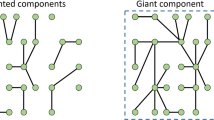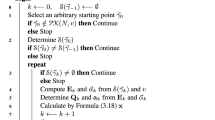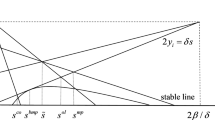Abstract
I examine when, how, and which conventions arise in N-player games. Each player draws a random sample of strategies used in the recent past, and then chooses a strategy in response to this sample. A player’s response is determined by a behavioural rule, which maps from the set of recently used strategy profiles to a subset of his own strategy set, and each element in the latter set is chosen with positive probability. A random sample of strategies is monomorphic if it contains only one distinct strategy for each of the other players. The behavioural rule of a player is responsive if, on drawing a monomorphic sample, there is a positive probability of playing a best-response to the other players’ strategy profile that is induced by their respective strategies in that sample; in addition, if the said induced strategy profile supports a strict Nash equilibrium, then a strategy played by him in the recent past is chosen with the complementary probability. A game is weakly acyclic if there exists a ‘best-response path’ from each outcome that is not a strict Nash equilibrium to a strict Nash equilibrium. I show that: (i) a convention forms whenever the players’ behavioural rules are responsive, and the game is weakly acyclic, (ii) in bi-matrix games, individuals described by the behavioural rule of extreme optimism—whereby, conditional on the random sample, they play a best-response to the most optimistic belief about the other player’s strategy choice—perform better than individuals described by any other responsive behavioural rule in the sense that the convention that is most preferred by the former is always in the stochastically stable set, and (iii) in bi-matrix pure coordination games, the said convention is the uniquely stochastically stable state if the other player’s behavioural rule is ‘mildly different’ from extreme optimism.
Similar content being viewed by others
References
Alós-Ferrer, C., Ania, A.B.: The evolutionary stability of perfectly competitive behavior. Econ. Theory 26(3), 497–516 (2005)
Alós-Ferrer, C., Netzer, N.: The logit-response dynamics. Games Econ. Behav. 68(2), 413–427 (2010)
Alós-Ferrer, C., Netzer, N.: On the convergence of logit-response to (strict) nash equilibria. Econ. Theory Bull. 5(1), 1–8 (2017)
Axelrod, R.: The Evolution of Cooperation. Basic Books, New York (1984)
Bergin, J., Bernhardt, D.: Cooperation through imitation. Games Econ. Behav. 67(2), 376–388 (2009)
Bilancini, E., Boncinelli, L.: Social coordination with locally observable types. Econ. Theory 65(4), 975–1009 (2018)
Bilancini, E., Boncinelli, L.: The evolution of conventions under condition-dependent mistakes. Econ. Theory 69(2), 497–521 (2020)
Blume, L.E.: The statistical mechanics of strategic interaction. Games Econ Behav 5(3), 387–424 (1993)
Blume, L.E.: Population Games. In: Arthur, B., Durlauf, S., Lane, D. (eds.) The Economy as an Evolving Complex System II, pp. 425–460. Addison-Wesley, Boston (1997)
Ellison, G.: Basins of attraction, long run stochastic stability, and the speed of step-by-step evolution. Rev. Econ. Stud. 67(1), 17–45 (2000)
Foster, D., Young, H.P.: Stochastic evolutionary game dynamics. Theor. Popul. Biol. 38(2), 219–232 (1990)
Hedlund, J.: Imitation in cournot oligopolies with multiple markets. Econ. Theory 60(3), 567–587 (2015)
Hurkens, S.: Learning by forgetful players. Games Econ. Behav. 11(2), 304–329 (1995)
Hwang, S.H., Newton, J.: Payoff-dependent dynamics and coordination games. Econ. Theory 64(3), 589–604 (2017)
Juang, W.T.: Rule evolution and equilibrium selection. Games Econ. Behav. 39(1), 71–90 (2002)
Josephson, J., Matros, A.: Stochastic imitation in finite games. Games Econ. Behav. 49(2), 244–259 (2004)
Josephson, J.: Stochastic better-reply dynamics in finite games. Econ. Theory 35(2), 381–389 (2008)
Josephson, J.: Stochastic adaptation in finite games played by heterogeneous populations. J. Econ. Dyn. Control 33(8), 1543–1554 (2009)
Kandori, M., Mailath, G., Rob, R.: Learning, mutation, and long run equilibria in games. Econometrica 61(1), 29–56 (1993)
Kaniovski, Y.M., Kryazhimskii, A.V., Young, H.P.: Adaptive dynamics in games played by heterogeneous populations. Games Econ. Behav. 31(1), 50–96 (2000)
Karandikar, R., Mookerjee, D., Ray, D., Vega-Redondo, F.: Evolving aspirations and cooperation. J. Econ. Theory 80(2), 292–331 (1998)
Khan, A.: Evolutionary stability of behavioural rules in bargaining. J. Econ. Behav. Organ. (2021) (Forthcoming)
Khan, A., Peeters, R.: Cognitive hierarchies in adaptive play. Int. J. Game Theory 43(4), 903–924 (2014)
Matros, A.: Clever agents in adaptive learning. J. Econ. Theory 111(1), 110–124 (2003)
Robson, A.J., Vega-Redondo, F.: Efficient equilibrium selection in evolutionary games with random matching. J. Econ. Theory 70(1), 65–92 (1996)
Sáez-Marti, M., Weibull, J.: Clever agents in Young’s evolutionary bargaining model. J. Econ. Theory 86(2), 268–279 (1999)
Vega-Redondo, F.: The evolution of Walrasian behavior. Econometrica 65(2), 375–384 (1997)
Young, H.P.: The evolution of conventions. Econometrica 61(1), 57–84 (1993)
Young, H.P.: Individual Strategy and Social Structure: An Evolutionary Theory of Institutions. Princeton University Press, Princeton (1998)
Author information
Authors and Affiliations
Corresponding author
Ethics declarations
Conflict of Interest
The author declares that no funding has been received for this study. The author further declares that there is no conflict of interest.
Additional information
Publisher's Note
Springer Nature remains neutral with regard to jurisdictional claims in published maps and institutional affiliations.
I would like to thank an anonymous referee and the editor for their helpful comments on this paper.
Rights and permissions
About this article
Cite this article
Khan, A. Evolution of conventions in games between behavioural rules. Econ Theory Bull 9, 209–224 (2021). https://doi.org/10.1007/s40505-021-00204-0
Received:
Accepted:
Published:
Issue Date:
DOI: https://doi.org/10.1007/s40505-021-00204-0




